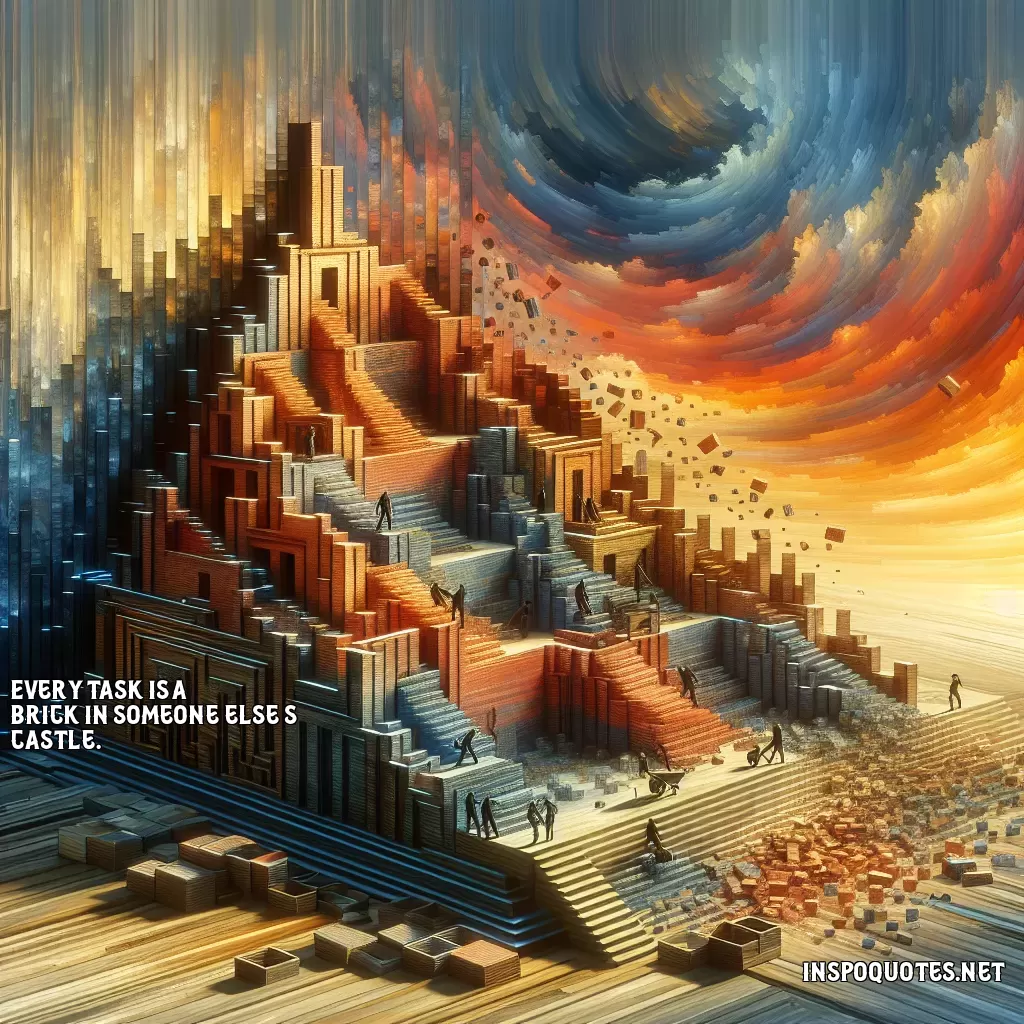
Every task is a brick in someone else’s castle.
Author: Rebecca Solnit
👁️ 26 views
The quote "Every task is a brick in someone else’s castle" suggests that each action or task performed by an individual contributes to a larger project, goal, or entity that may not always directly benefit them. In many ways, this can reflect the interconnected nature of work and society. Individuals often fulfill roles and complete tasks that, while seemingly mundane or small, form the foundation of something larger than themselves. Firstly, the "brick" in this metaphor represents individual efforts or tasks. Just like bricks are the fundamental units in construction, small tasks are essential for building complex projects or systems. Without bricks, a castle cannot be built; similarly, without individual tasks, grand objectives cannot be achieved. The "castle" signifies the larger goal or achievement, which might be a company, organization, or even societal advancements. Often, the outcomes of collective human effort are more significant than one person's contribution. For example, an employee's daily work is a small part of a company's success, which might be considered the "castle" they help build. Additionally, there's an implication of hierarchy and ownership. The castle belongs to someone else—perhaps an organization, a leader, or society at large—rather than the bricklayer, hinting at the idea that people’s labor often benefits others more directly than themselves. It can provoke thought on how individuals contribute to larger constructs, sometimes without seeing the direct benefits. Nonetheless, without each worker’s contribution, the overall structure might not reach completion. Overall, this quote encourages reflection on the roles people play in the larger context of their work and the interconnectedness within any organized human endeavor. It also invites contemplation on the nature of work, ownership, and the distribution of the benefits from collaborative efforts.
Quote By: Rebecca Solnit
Rebecca Solnit is an acclaimed American writer, historian, and activist, renowned for her insightful essays and books that traverse the realms of culture, politics, and the environment. Born on April 24, 1961, in Bridgeport, Connecticut, Solnit's journey as a writer began in earnest during her college years, which culminated in her graduation from the University of California, Santa Cruz. Her diverse educational background provided a rich foundation for her explorations into social justice, feminism, and the complexities of modern life.
Rebecca Solnit's literary career gained significant momentum with her 1994 essay collection, "River of Shadows: Eadweard Muybridge and the Technological Wild West." This work showcased her unique ability to weave together historical narrative and cultural criticism. Over the years, she has authored more than 20 books, including the seminal "Men Explain Things to Me" (2014), which catalyzed discussions around gender dynamics and the phenomenon of “mansplaining.” Solnit's incisive prose and ability to dissect complex ideas with clarity have earned her a prominent place in contemporary thought.
In addition to her written works, Rebecca Solnit has been an outspoken advocate for various social causes. She is a vocal supporter of environmentalism, women's rights, and civil liberties, often using her platform to raise awareness about the pressing issues facing society today. Solnit's activism is closely intertwined with her writing, as she believes that storytelling and critique are vital tools for fostering social change.
Her contributions have not gone unnoticed; Rebecca Solnit has received numerous awards and honors for her work, including a Lannan Literary Award and recognition as a prestigious Fellow of the New York Institute for the Humanities. Through her essays, books, and public speaking engagements, she continues to inspire readers and activists alike. As a thought leader, Rebecca Solnit's voice is crucial in the ongoing dialogue about justice, equity, and the future of our planet. Her insights remind us of the power of words to provoke thought and action in an increasingly complex world.